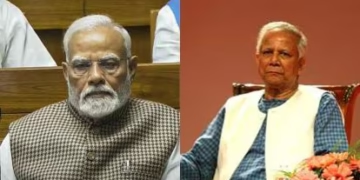Prime Minister Narendra Modi met Muhammad Yunus, the chief advisor of Bangladesh’s interim government, on the sidelines of the BIMSTEC Summit in Bangkok today. External Affairs Minister S. Jaishankar and National Security Advisor Ajit Doval were also present during the meeting.
This marks the first interaction between the two leaders since Yunus, a Nobel laureate, assumed power in Bangladesh following the ousting of the Sheikh Hasina government in August last year. The meeting holds significance amid growing concerns in New Delhi about Dhaka’s increasing closeness to Beijing, a shift that has captured the attention of Indian policymakers.
Relations between India and Bangladesh have cooled since the overthrow of the Sheikh Hasina-led Awami League government in a nationwide movement last year. Following the regime change, Bangladesh’s former prime minister fled to India, leading to heightened tensions. India has raised concerns about attacks on minorities in Bangladesh in the wake of the political upheaval, though Dhaka has firmly stated that issues concerning its minorities are an internal matter.
Furthermore, recent remarks by Yunus have added to the strain in bilateral ties. During a visit to China, Yunus made controversial comments about India’s Northeastern states, which were perceived as offensive by Indian leaders. He referred to the region, known as the “Seven Sisters,” as landlocked and suggested that Bangladesh could act as a “guardian of the ocean” for the region, positioning itself as a key gateway for the Chinese economy.
His comments stirred strong reactions from the Indian state of Assam. Chief Minister Himanta Biswa Sarma condemned Yunus’s statement, calling it “offensive.” Sarma emphasized the need for robust infrastructure connecting the Northeast to the rest of India, specifically urging the development of better rail and road networks to reduce the region’s dependence on the strategically sensitive “Chicken’s Neck” corridor.
The “Chicken’s Neck” is a narrow stretch of land in West Bengal that connects the Northeast to the rest of India. It is bordered by Nepal, Bhutan, and Bangladesh, making it a vulnerable and strategically significant area. Sarma’s response highlights India’s concerns about the security of this corridor, which has occasionally been the subject of geopolitical debates. Sarma called for exploring alternative routes to strengthen the Northeast’s connectivity and reduce the region’s reliance on the Chicken’s Neck.
In an effort to ease tensions, Prime Minister Modi had previously written to Yunus on March 26, extending his wishes to Bangladesh on its Independence Day. In his letter, Modi emphasized the shared history between the two nations, particularly highlighting the Bangladesh Liberation War, and reiterated India’s commitment to fostering a partnership based on mutual respect, stability, and prosperity.
The meeting between PM Modi and Yunus underscores the complexity of the evolving relationship between India and Bangladesh, with both nations balancing historical ties and current geopolitical shifts. As Bangladesh seeks closer ties with China, India remains keen to ensure that its strategic interests, especially in the Northeast, are safeguarded.
Also Read: Filmmaker Sanoj Mishra Arrested After False Rape Allegation by Live-in Partner Pooja Sharma















 Categories
Categories









